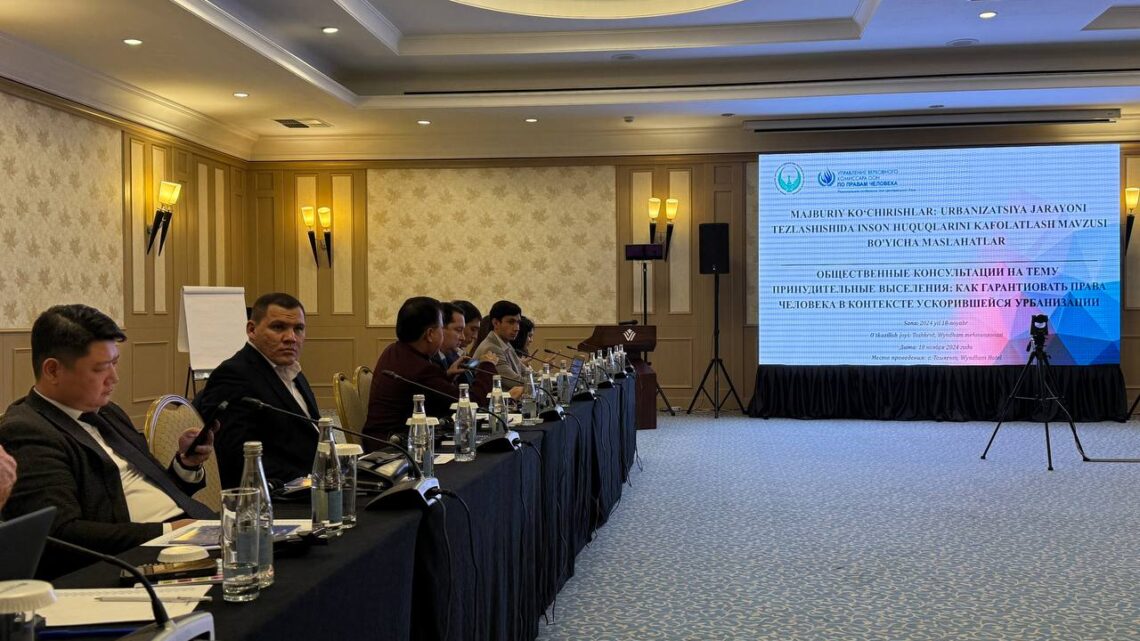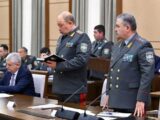How to reconcile urbanization, renovation and human rights?
21.11.2024On November 18, 2024, Tashkent hosted the first round of consultations following the visit of the UN Special Rapporteur on the right to adequate housing, Mr. Balakrishnan Rajagopal. The topic of the meeting was “Forced evictions: how to guarantee human rights in growing cities”. It should be recalled that the Special Rapporteur visited Uzbekistan in August 2024. (Visit of the Special Rapporteur on the right to adequate housing to Uzbekistan – Housing news).
The consultations were organized by the local office of the Office of the United Nations High Commissioner for Human Rights (OHCHR) and the National Centre of the Republic of Uzbekistan for Human Rights (NCHR). The event was attended by members of parliament, representatives of governmental and judiciary bodies, international organizations and civil society.
NCHR representative Nabiyev Abbosbek said that a Road Map is being prepared to implement the Special Rapporteur’s recommendations, which will consider all the proposals of government bodies and civil society activists.
Ildar Faizullin, National Program Coordinator in Uzbekistan of the OHCHR Regional Office for Central Asia, noted the importance of respecting the rights to adequate housing:
“Today’s dialog is the first of its kind, and the issues involved have not been discussed in such a wide circle before. At our table there are representatives not only of state structures, but also of civil society and activists who play an important role in promoting human rights. The home is the foundation of each person’s stability and security, the center of their social and emotional life. Home is a sacred place where we strive to live in peace and with a sense of dignity. Unfortunately, in recent years, housing has increasingly been perceived as a commodity, an object of commerce.
According to international law, the Right to Adequate Housing means that everyone should not fear eviction and should have access to appropriate living conditions, social services and employment opportunities. However, violations of the rights to Adequate Housing often go unpunished, and many authorities do not perceive it as a Basic Human Right. The monetization of housing is that it is not seen as a basic good necessary for a normal life, but as a means of profit or a commodity to be traded”
A barrage of laws and their enforcement
As Diora Rafieva, Public&Security lawyer, said at this meeting, «we have a ‘volley’ of low-quality regulations. [Officials] replied that they have experts working for them. Apparently, they either have bad experts, or they don’t listen to experts. I gave specific examples from their own “successful” examples. I emphasized the need to conduct an anti-corruption examination of Law No. 781 and the future Law on Renovation, especially in the definition of terms, in the supervision of funds and their financing, powers of officials, etc. There are “rat holes” in the regulations».
The key issue is the courts.
Special Rapporteur Balakrishnan Rajagopal, speaking on-line, noted that in court disputes, judges are almost always on the side of the developer, that compensation is inadequate, that citizens’ opinions on urban projects are not asked, etc.
Indeed, in Uzbekistan, written laws proclaim the protection of the right of owners. However, law enforcement brings them to naught.
For example, in June 2022, Uzbekistan adopted Law No. ZRU-781 “On Procedures for Withdrawal of Land Plots for Public Needs with Compensation”. Its provisions prescribe the establishment of Centralized Funds for Compensation of Losses under khokimiyats. Compensation commissions consisting of deputies, representatives of non-governmental non-commercial organizations and employees of state bodies are formed at local councils of people’s councils. It is they who should deal with compensation issues.
At the trials that we monitored in the spring of 2023, judges refused to consider the developers’ applications for deprivation of ownership rights. The judges argued that there was no compensation commission established under the relevant khokimiyat, and therefore, the developer did not apply to it.
However, on November 20, 2023, the Plenum of the Supreme Court of the Republic of Uzbekistan adopted Resolution No. 28, “On Amendments and Additions to Certain Resolutions of the Plenum of the Supreme Court”. In Article 11 of this Resolution, the Supreme Court instructs the Courts to take into account that «on the basis of Articles 12, 27 and 34 of the ZRU No. 781, disputes related to the provision of the right holder with the established compensation shall be initially considered by compensation commissions, however, the failure of the compensation commission to consider an application within the time limits established by law shall not prevent the court from considering the dispute».
And on it goes!
During 2024, we have been monitoring several eviction proceedings, and we have decisions where judges deprive homeowners of their property rights. The civil cases are brought on the claim of developers, private commercial companies. Again, the judge applies the law on eviction for public needs, although the issue is the commercial interests of the private developer.
It appears that the Supreme Court has given the go-ahead to again seize private property of citizens at the request of developers.
Diora proposed to «analyze the judicial practice and, as a result, to develop a Resolution of the Plenum of the Supreme Court, which would serve as a guide and integrate international law. She suggested the possibility of judicial norm control».
Khoorshid Alimardanov noted a strange pattern in our administrative courts: depending on the weight and authority of the plaintiff, in the same case (the same developer, the same outgoing decision of the Hokim, the same demolition zone, the same jurisdiction of the court) one dweller is denied his request to cancel the decision of the Khokim on demolition, while another owner is granted the same request and his premises remain intact. This was illustrated by the Mirabad Avenue case (LOCAL ACTIVIST FIGHTS AGAINST IMMINENT FORCED EVICTIONS – Housing news).
Development of historic neighborhoods
According to Shukhrat Ganiev, a member of the Central Asian Network on the Right to Adequate Housing, and Diora Rafieva, historic neighborhoods are being demolished in Bukhara and Samarkand. Moreover, when determining the value of an old house, appraisers approach it with the same principles of taking into account the depreciation of bricks. For example, in Bukhara, when demolishing a 500-year-old house, the owner is given a small fraction, arguing that “the house is old, the depreciation period has passed”. The cost of land in the super expensive historical center is not taken into account.
In Samarkand, construction is in full swing in the protected zone, tower cranes are spinning right above historical buildings.
Renovation
The speech of Mr Yakubov, official of the Ministry of Economy and Finance, generated a lively discussion at the meeting. According to him, Uzbekistan is preparing a grandiose urbanization and renovation. The relevant laws and concepts will be adopted – that’s the “volley of Laws”!
In short, two-story and four-story buildings of the Soviet period will be demolished. In their place will be built all sorts of high-rise apartment buildings. A lot of words were said. We caught the words “80%”. That’s how many people should agree to be demolished in the renovation zone.
It is surprising that this speech about impending renovation by the representative of the Ministry of Economy coincided with the speech of the Uzbek President Shavkat Mirziyoyev before the new parliament.
Saiyora Khodjaeva, Director of NGO “Institute of Demography and Law”, reminded that in 2020, when PKM #911 with its threshold of “75% of owners agreeing to demolition” was in force, she and the Ombudsman submitted a request to the Constitutional Court about the constitutionality of this provision, and the Constitutional Court then declared it unconstitutional, and this paragraph was removed. And now they are trying to “sell” this percentage threshold to us again in a different guise .
A colleague from the Ministry of Economy was supported by a representative of the National Guard. He told a heartwarming personal story. It turns out that he once bought an apartment in an old building, which was later demolished, different developers came, finally one offered a good sum, and the National Guard agreed. He and his wife used the money to go to Turkey. And the other residents “were so greedy that it was horrible”.
Khoorshid Alimardanov said that not all citizens of Uzbekistan have National Guard uniforms with epaulettes.
There was an opinion that the renovation should not include the private sector with individual houses (villas). However, there is no difference in the legislation between a private house and a private apartment. Both objects are protected equally. This is most likely due to the fact that members of our government live in exactly such villas, in elite mahallas.
And this directly contradicts the main “pro” renovation argument. The representative of the Ministry of Economy at the meeting, and President Mirziyoyev in Parliament, argue that the population is growing, and there is not enough land. According to the president, due to the annual population growth of one million people, there may be a shortage of land plots. At the same time, the transfer of agricultural land for construction threatens the country’s food security. The law on renovation will allow the construction of modern high-rise buildings in place of old housing, saving resources.
It would seem most reasonable to demolish the one-story houses first. But no. The villas are sacred. Officials and other oligarchy must live well.
The same representative of the Ministry of Economy boasted that in Uzbekistan more than 90% of the population is provided with housing, and such indicators are not even in Europe. To which Diora Rafieva asked what then is the point of building massive residential complexes, since this is not a priority. «Why then do not direct resources to this, i.e. increase the number of schools, hospitals, etc. as a priority, and not intensively engage in housing renovation? They themselves say that communications are outdated and there are not enough social facilities, » Diyora logically asked.
There were no answers to the pressing questions.
We asked the representative of the Ministry of Economy, what kind of renovation can we talk about in the absence of the Master-Plan of the city. To which he said that without a master plan there will be no renovation (!!!). I suggest to remember this.
All current processes of so-called urbanization are carried out without the Master-Plan of the city (the last one was adopted in 1989) and with gross violation of urban planning rules and regulations. Now all priorities in urbanization are given to the construction of residential complexes, business centers and shopping and entertainment centers. UN Special Rapporteur Balakrishnan Rajagopal in his end mission remarks at in August 2024 pointed out that master plans should be developed taking into account the opinion of the population. The society has the right to know what the government is preparing for them. Participation of citizens in the form of public control is also provided for in Chapter 6 of the Urban Planning Code of Uzbekistan. Recently, the media reported about some general plans for Tashkent and even for its separate districts. However, no one asked for the public’s opinion.
Whose land?
I drew the attention of the audience to the following “time bomb”.
In the decisions of khokims of 2017-2019, land was allocated to the private firms on the right of permanent use. That is, firms of developers now become users of land from 1 to 10 hectares in Tashkent. How will this affect the rights of apartment owners in the future? A firm user of this land can do whatever it wants. The legislation does not say anything about it.
What’s next?
As it was said, this is just the first meeting of members of state bodies and civil activists on the implementation of the Special Rapporteur’s recommendations. So far we have outlined the problems. We would not want this meeting to be just a tick box for the next report of the authorized state bodies.


